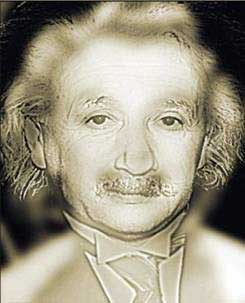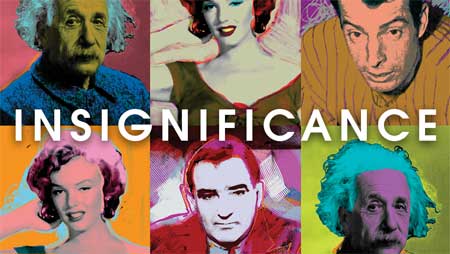Play (1982)
by Terry Johnson
Directed by Daniel Gidron
Central Square Theater
Cambridge, MA
January 9 – February 9, 2014
With Richard McElvain (The Professor), Barry M. Press (The Senator), Stacy Fischer (The Actress), Alexander Platt (The Ballplayer)
This spoofy play, which has overtones of various themes of the nascent nuclear age of the early 1950s, does not really have a plot, and its characters, though not identified by name, draw their significance from their longstanding presence in popular culture. The playwright creates an unexpected conjunction of them in a hotel room, then experiments with their imagined interactions to say something about celebrity, annihilation and the human condition, and to show that Marilyn Monroe was a lot smarter than people thought.
It is an odd and not very successful experiment, except for the Marilyn Monroe part. Though the actors are quite good, and their director, Daniel Gidron, has delivered a passel of very fine productions around town many of them at the Central Square Theater, there is something just too seemingly thin about this play to support a compelling production.
Central Square Theater has made a point of doing a whole series of plays about science and scientists and some of them have been superb. The How And The Why, Photograph 51 and Operation Epsilon were among those, all excellent offerings.
This play is too jokey and gimmicky to really go very far, even in the hands of a talented director. It is great to hear the Marilyn Monroe character (Stacy Fischer) explain relativity to the Einstein character (Richard McElvain) elaborately and convincingly; indeed this is the best part of the play. But it is not enough to carry it.
What the Joe DiMaggio and Joe McCarthy characters are doing here is not clear. Barry M. Press has a boisterously convincing presence as McCarthy, but what his bullying, or, for that matter, what the fizzling marriage of Monroe and DiMaggio, have to do with anything except that they happened in the early 1950s is not at all clear.
Certainly, there is fictionalized history that makes for good drama and literature, but it does so when there is a point to the narrative. I kept waiting for something to emerge from this narrative, but nothing really came.

In the second act there is a bright glaring of stage lights, presumably signifying a nuclear blast, but how and why this fits in with anything else that happens onstage, other than that Einstein is a physicist and McCarthy a brutally manipulative politician, remains a mystery.
I am very curious to know if the play comes off better read than performed. Perhaps its offbeat conjunction of characters seems funnier, and more surrealistically entertaining, than it does when transferred to live performance, and the irony of the illusory significance of celebrity in the face of nuclear annihilation emerges more effectively. That is my best guess about what the author is trying to put forward here, but on stage it did not gel.
There is a film of Insignificance (1985) directed by Nicholas Roeg and adapted by Terry Johnson from his play; I have not seen it, but would also be very curious to find out if that medium provided enough of a different angle to make it come off better.
If this were done as a postmodern performance piece rather than as a standard piece of theatre, its title might be differently viewed – as a self-referential piece of irony, the failed attempt to signify something by parading forth a series of historic celebrities, in other words, a large performance joke. If that what this play had in mind, its narrative context did not provide enough to convey it.
– BADMan

Leave a Reply